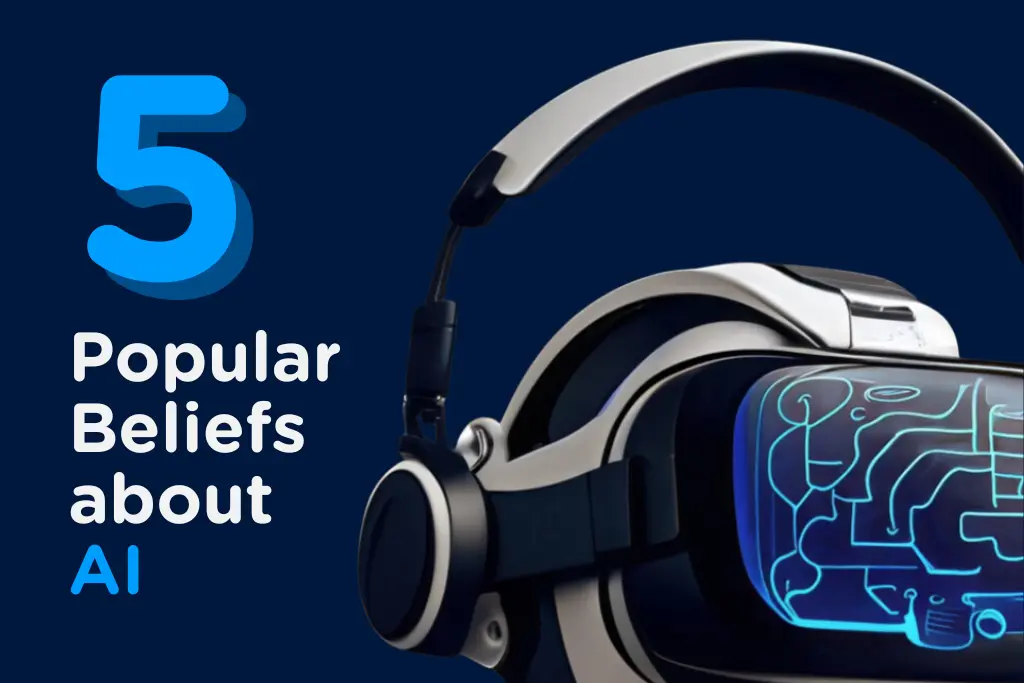In recent years, the use of artificial intelligence has greatly developed, whether in the workplace or in everyday life. Beyond the trend, the generalization of AI raises a number of ethical, technical, and professional questions. This article unveils the 5 prevailing beliefs about AI in business, aiming to discern the realities from the myths.

The main popular beliefs about AI in business
Number 1: AI will steal human jobs
NEITHER TRUE NOR FALSE: This is undoubtedly the subject that raises the most concerns: can AI replace human work, and therefore potentially eliminate jobs?
On the one hand, it is undeniable that technological progress, and this is well before the advent of AI, replaces workers performing the most repetitive tasks, whether in industry or services. In 2014, the consulting firm Roland Berger published a study predicting that by 2025, 20% of tasks would be automated, representing a threat to 3 million French employees. We are currently witnessing a transformation in the employment landscape with strong growth in jobs related to new technologies. In most sectors, and especially the tertiary sector, artificial intelligence does not replace humans: it assists them, allowing them to free themselves from repetitive tasks to focus on those with high-added value.
Number 2: AI is more objective than man, especially in legal decision-making
FALSE: One might think that a machine, having neither emotions, nor personal preferences, is more impartial than a human being. And yet! Artificial intelligence algorithms use data sets, which are the result of months or even years of recorded human behaviour. Therefore, they tend to accentuate biases and preferences contained in these data sets. And this can represent an ethical or even legal risk, for example when a recruitment algorithm selects profiles based on on discriminatory crtieria such as gender.
Thus, in a field like the legal one, where decision making must be as impartial as possible, AI cannot replace a human being. The expertise and common sense of the lawyer or attorney must have the last word over the machine, which can only make recommendations. That’s why, in the legal and banking sectors, the user must always be able to resort to a human when contesting a decision made by an algortihm. This point is provided for in the EU’s General Data Protection Regulation.
Number 3: AI will take control over all our tools
FALSE: Artificial intelligence cannot ‘take control’, for the simple and good reason that it depends on humans and cannot function without them. Of course, AI algorithms can facilitate the operation of tools already used by professionals and interact with them to simplify daily tasks. However, we are far from the science fiction fantasy in which machines replace humans and take over their tools. Thanks to the sophistication of its algorithms, AI can make relevant recommendations, which indeed has an impact on our consumption and decision-making: music, movies, travel, online shopping… That said, it is always a controlled use of technology, where humans retain control.
This could also interest you: Artificial Intelligence: What Is It and What Is In Store For Us?
Number 4: AI and data security are not compatible
TRUE FOR MANY, NOT FOR DILITRUST: Data security is a major concern for companies, particularly in the legal sector, where confidentiality is a top priority. It’s widely believed that artificial intelligence relies on personal user data, raising valid worries about potential leaks or theft. Adding to this In the realm of AI, it’s commonly assumed that encrypted data remains off-limits for algorithms, hindering effective processing. The truth? While many developers face limitations in this area, it doesn’t mean it’s an unsolvable challenge.
Here at DiliTrust we recognise the criticality of data security in the legal sector and have developed pioneering solutions to address this precise issue. In practical terms, our approach involves categorizing data into two distinct streams: encrypted and pseudonymized. While AI algorithms cannot directly interact with encrypted data, they efficiently process the pseudonymized subset, ensuring both data usability and confidentiality. For example, our AI uses OCR to recognize text and extract it through binary representation, ensuring our client’s data remains confidential. This method not only aligns with stringent GDPR requirements but also sets a new standard in leveraging AI without compromising data security.
🚀 Take off and discover how your contracts go through our solution: Download our guide
Number 5: AI will change the way we practice law in business
TRUE: Artificial intelligence is increasingly used by legal departments. Indeed, it changes the way the law is practiced in business, in the sense of improving productivity, simplifying work and better risk management.
First of all, tools such as contract management or predictive justice facilitate information search and data processing, which frees up time previously devoted to tedious tasks or heavy processes: governance instance management, reading and sorting contracts, information search, analyses and audits… Legal departments can therefore focus on the strategic aspect of their profession, while avoiding costly mistakes, thanks to the precision of algorithms.
Of course, AI does not replace common sense and the expert opinion of legal professionals, who always have the final say on decision-making. The tool simply saves time, but also produces analyses on large volumes of data, which is impossible in manual management.
Empowering Legal Departments with DiliTrust’s Artificial Intelligence
The DiliTrust Governance suite is a software made up of a set of modules designed to simplify your company’s legal activities. The five modules comprising the suite are: Board Portal, Contracts, Entities, Litigation and Document Library.
DiliTrust provides your organization with secure tools and features, using artificial intelligence. These tools are not intended to replace humans. On the other hand, these tools not only allow you to transfer certain repetitive and tedious tasks (statistical analyses, document organization and contract monitoring), but also to enhance your precision and nuance of analysis, which benefits the strategy of the entire company.
Interested in optimizing your daily operations with AI? Reach out to us!


